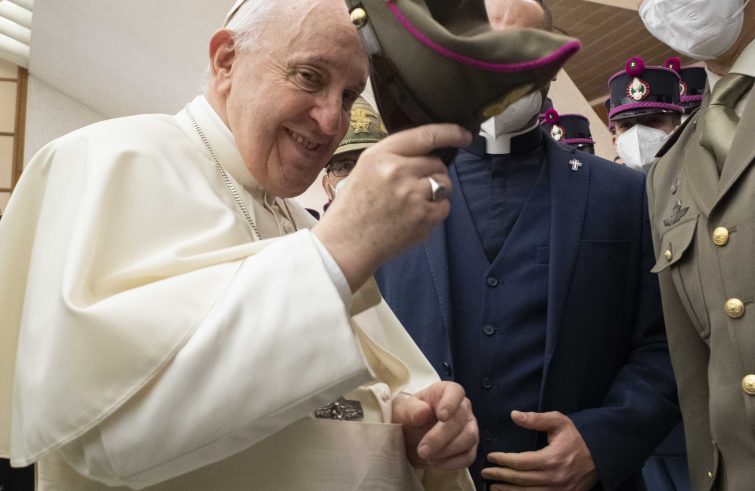
“Jesus, Mary and Joseph are in a sense the primordial nucleus of the Church. And we too, we should always consider whether we ourselves are protecting Jesus and Mary, for they are also mysteriously entrusted to our own responsibility, care and safekeeping,” the Pope said in his catechesis for the Wednesday general audience in Paul VI Hall devoted to Saint Joseph, “Patron of the Church”, which completes the cycle of catecheses on Saint Joseph. “To safeguard” is the focus of the audience, a verb already chosen by Francis in his first Mass as Pontiff. In the final remarks Francis appealed to Europe, as the winds of war are blowing in Ukraine: “may the nations of this continent, mindful of their Christian roots, awaken the spirit of reconciliation, brotherhood, solidarity, peace, of respect for each Country and for its freedom.”
“The Christian is like Saint Joseph: he must safeguard”, the Pope said in unscripted remarks:
“to be a Christian is not only to receive the faith, to confess the faith, but to safeguard life, one’s own life, the life of others, the life of the Church.”
“The Son of the Most High came into the world in a condition of great weakness”, Francis recalled, citing several times in his catechesis the Apostolic Letter Patris Corde, written to mark the 150th anniversary of the proclamation of St Joseph as Patron Saint of the Catholic Church: “He wanted to be defended, protected, cared for. God trusted Joseph, as did Mary, who found in him the bridegroom who loved and respected her and always took care of her and the Child.” “In this sense, “Saint Joseph could not be other than the Guardian of the Church, for the Church is the continuation of the Body of Christ in history, even as Mary’s motherhood is reflected in the motherhood of the Church.” “In his continued protection of the Church, Joseph continues to protect the child and his mother, and we too, by our love for the Church, continue to love the Child and His mother”, the Pope assured.
“Every person who is hungry and thirsty, every stranger, every migrant, every person without clothes, every sick person, every prisoner is the Child whom Joseph looks after. And we are invited to safeguard these people, these our brothers and sisters, as Joseph did”,
is Francis’ appeal. Saint Francis is invoked as protector of all the needy, the exiled, the afflicted, and even the dying, Francis remarked, mentioning past Wednesday’s catechesis. “And we too must learn from Joseph to ‘safeguard’ these goods”, the Pope reminded the faithful: “to love the Child and His mother; to love the sacraments and the people of God; to love the poor and our parish. Each of these realities is always the Child and His mother. We must safeguard, because with this we safeguard Jesus, as Joseph did.”
“Nowadays – Francis denounced – it is an everyday occurrence, to criticise the Church, to point out its inconsistencies, to point out its sins, which in reality are our inconsistencies, our sins, because the Church has always been a people of sinners who encounter God’s mercy.”
“Let us ask ourselves if, in our hearts, we love the Church as she is, the People of God on the journey, with many limitations, but with a great desire to serve and to love God”, is the exhortation of the Pope, for whom “only love makes us capable of speaking the truth fully, in a non-partisan way; of saying what is wrong, but also of recognising all the goodness and holiness that are present in the Church, starting precisely with Jesus and Mary.” “Walking with the Church”, he continued off text:
“the Church is not that little group that is close to the priest and commands everyone, no. The Church is everyone. On the journey. Safeguarding one another.” Francis invites us to ask ourselves: “When I have a problem with someone, do I try to look after them, or do I immediately condemn them, spit on them, destroy them?”.
“Where our mistakes become a scandal, let us ask St Joseph to give us the courage to speak the truth, ask for forgiveness, and humbly begin again”,
is the final mea culpa. Francis thus called upon the faithful in Paul VI Hall: “I encourage you to ask for the intercession of Saint Joseph precisely at the most difficult times in the life of you and of your communities.” “Where persecution prevents the Gospel from being proclaimed, let us ask St Joseph for the strength and patience to endure abuse and suffering for the sake of the Gospel”, Francis said. “Where material and human resources are scarce and make us experience poverty, especially when we are called to serve the last, the defenceless, the orphans, the sick, the rejected of society, let us pray to St Joseph to be Providence for us.” “How many saints have turned to him!”, Francis exclaimed: “How many people in the history of the Church have found in him a patron, a guardian, a father! Let us imitate their example.” Finally, an invitation “to pray together, each in their own language”, with the prayer e placed at the conclusion of the Letter Patris corde, entrusting to him our intentions and, in a special way, the Church that suffers and is in trial.”











